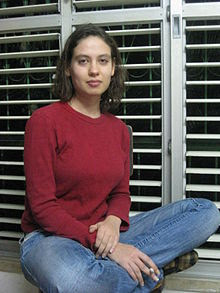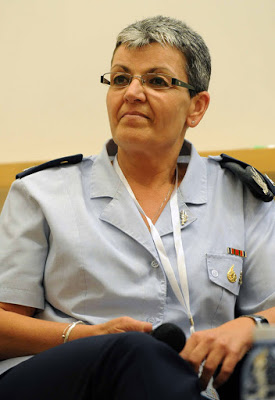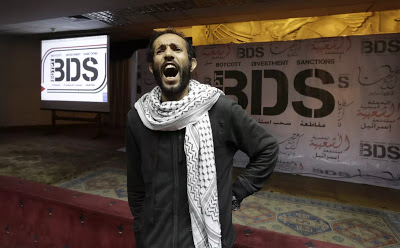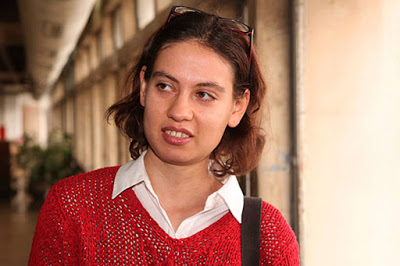 |
| Brig.-Gen.-Sima-Vaknin-Gil – reading one of the papers she censors |
In the article below we see how Israel is fighting anti-Zionist
and BDS on-line using a variety of dirty tricks and paid trolls. But who is this Sima Vaknin-Gil, the director
general of Israel’s Ministry for Strategic Affairs and Public Diplomacy? Well she is or was the Chief Military Censor
in Israel. As such she is eminently
qualified to try and censor pro-Palestinian activists abroad.
Despite being the ‘only democracy in the Middle East’ Israel has a highly developed system of censorship which involves submitting articles prior to publication. Included in realm of censorship is social media, which Israel is increasingly trying to control outside its borders via sweet heart deals with Facebook and Zuckenberg.
Censorship in Israel derives from the British Colonial Military Regulations which were never repealed The excuse is that Israel is in a permanent state of war which in turns derives from its permanent state of emergency.
Tony Greenstein
create a community of fighters,” said Sima Vaknin-Gil, the director
general of Israel’s Ministry for Strategic Affairs and Public Diplomacy, to
Israeli tech developers at a forum last month dedicated to the topic.
 |
| Anat Kamm – copied and leaked 2,000 Israeli Military Files – served 3.5 years, betrayed by Ha’aretz as source |
Vaknin-Gil?
retired Chief Military Censor who said the following in an in-depth
interview in Hebrew some months ago:
 |
| Brig.-Gen.-Sima-Vaknin-Gil – Israel’s former Chief Military Censor |
 |
| Col. Ariella ben Avraham new chief military censor |
 |
| BDS – the target of Israeli dirty tricks |
sits at the TV news desk at 6pm and had managed to go through the whole line-up
before going on air.
* “I find it very troubling that the work I’ve done was on uniform. It
reminds me of such regimes that I do not wish to be associated with” she
says, followed by “I can tell you that seniors in Israel, in the security
services, share my view that censorship and
democracy do not go hand in hand, and more so when it’s censorship on uniform.”
* Yisrael Ha’yom newspaper (the Adelson owned ‘Bibiton’) has a former military
censor as its managing editor.
* “This strange agreement under which we live wouldn’t work if you and I didn’t
come from the same place, in which you wish to do your job but don’t wish to
harm security–and I must do my job, but don’t wish to harm freedom of speech.
At the moment we understand that we both have identical interests, we can work
under such an agreement. But this is something
that only fits Israeli culture. It would never work in the US or in Britain.”
* One incident which had, according to her, unexpected consequences had proven
the tremendous power placed in the hands of the censorship. During the last
week of 2008, the first day of Operation Cast Lead, two “Arab” reporters working
for PressTV, Khader Shahin and Mohammed Sarchan were located by the border with
Gaza and were reporting in real time on the movement of military forces.
Through the direct intervention of Vaknin-Gil the two were arrested, brought to
trial and convicted of negligently transmitting information to the enemy. They
were both sentenced to two months in prison.
“This was my mistake,” says VG. “I didn’t know Khader Shahin. He’s not on my
speed-dial like Roni or Yoav [Roni Daniel and Yoav Limor report for Israeli
channels]. If they had made a mistake I would have called and told them: “Roni,
stop talking about this, it’s forbidden.”
 |
| Anat Kamm – Israel’s Julian Assange |
activated the police in order to find them so that I could speak to him and
explain that this was forbidden.
“It turned out that by making the call to the
police I activated the power of the censor in emergency. The request to locate
him meant an automatic arrest for violating section 113 of the criminal code:
transmitting information during wartime. This is a story I always tell about
myself, that I didn’t understand the power of the censor. I didn’t understand that what I do can activate a
power that is so serious, so draconian. Therefore I want to tell you, my
friends–whoever thinks the censor has no power, they simply don’t understand.”
Censorship and democracy do not go together, says Sima Vaknin-Gil, Israel’s chief censor, who says her job is to ensure ‘the absolute minimal harm to free speech, while guarding the secrets only.’
Covertly, Israel prepares to fight boycott activists online
TEL AVIV, Israel (AP) — Israel is using its world-leading expertise in cyber
security to take on the growing threat of the global pro-Palestinian movement
to boycott Israel.
nearly $26 million in this year’s budget to combat what it sees as worldwide
efforts to “delegitimize” the Jewish state’s right to exist. Some of
the funds are earmarked for Israeli tech companies, many of them headed by
former military intelligence officers, for digital initiatives aimed at
gathering intelligence on activist groups and countering their efforts.
“I want to create a community of fighters,” said Sima Vaknin-Gil,
the director general of Israel’s Ministry for Strategic Affairs and Public
Diplomacy, to Israeli tech developers at a forum last month dedicated to the
topic.
covert. Participants at the invite-only forum, held on the sidelines of a cyber
technology conference, repeatedly stood up to remind people that journalists
were in the room.
in the efforts are some of Israel’s top secret-keepers, including Sima Shine, a
former top official in the Mossad spy agency, and Vaknin-Gil, who recently retired
as the chief military censor responsible for gag orders on state secrets.
Israel has established itself as a world leader in cyber technology
innovation, fueled by graduates of prestigious and secretive military and
security intelligence units. These units are widely thought to be behind some
of the world’s most advanced cyber-attacks, including the Stuxnet virus that
attacked Iran’s nuclear energy equipment last decade.
talent pool of Israelis who translate their skills to the corporate world. Now
Israel is looking to harness their technological prowess for the fight to
protect Israel’s international image.
Vaknin-Gil said her ministry is encouraging initiatives to expose the
funding and curb the activities of anti-Israel activists, as well as campaigns
to “flood the Internet” with content that puts a positive face on
Israel. She said some of these actions will not be publicly identified with the
government, but that the ministry will not fund unethical or illegal digital
initiatives.
pro-Palestinian “BDS” campaign is a coalition of organizations that
advocate boycotts, divestment and sanctions against Israel. Inspired by the
anti-apartheid movement, BDS organizers say they are using nonviolent means to
promote the Palestinian struggle for independence.
The movement has grown into a global network of thousands of volunteers,
from campus activists to church groups to liberal Jews disillusioned by Israeli
policies. They lobby corporations, artists and academic institutions to sever
ties with Israel.
British academic unions have endorsed boycotts, student governments at
universities have made divestment proposals, and some famous musicians have refused
to perform in Israel. The BDS movement also claims responsibility for
pressuring some large companies to stop or modify operations in Israel. In its
latest push, it has urged top Hollywood actors to reject a government-paid trip
to Israel being offered to leading Oscar nominees.
Omar Barghouti, co-founder of the BDS movement, said “quite a few web
pages” that BDS websites linked to have mysteriously disappeared from the
Internet.
“We assume Israel’s cyber sabotage is ongoing, but we are quite pleased
that its detrimental impact on the global BDS movement has been dismal so
far,” he said.
anti-Semitism and seeks not to change Israeli policies, but ultimately to put
an end to the Jewish state.
Many online activists driving anti-Israeli campaigns on social media are
tech-savvy, second- and third-generation Muslims in Europe and the U.S. who
have grievances against the West and also lead online campaigns against
European and U.S. governments, said Elad Ratson, who tracks the issue for
Israel’s Foreign Ministry and spoke at last month’s cybersecurity forum.
allows activists to blast thousands of messages from social media accounts —
creating the illusion that many protesters are sharing the same anti-Israel or
anti-West message online.
remove pages it says incite violence against Israelis, and there has been talk
of advancing legislation to restrict Facebook in Israel. A Facebook
representative met with Strategic Affairs Minister Gilad Erdan in Israel last
week about the matter.
Ratson said social media giants are beginning to close inciting users’
accounts. Twitter said in a statement this month that since mid-2015, it has
closed more than 125,000 accounts that were “threatening or promoting
terrorist acts, primarily related to ISIS,” the Islamic State group. But
he said Islamist activists are simply moving to “Darknet” sites not
visible on the open internet.
Some Israeli tech companies are starting to build sly algorithms to restrict
these online activists’ circle of influence on the “Darknet,” so
activists think their message is reaching others when in fact it is being
contained, Ratson said.
forensic intelligence gathering, such as detecting digital or semantic
signatures buried in activists’ coding so they are able to track and restrict
their online activity.
Firewall Israel, a non-profit initiative sponsored by the Reut Institute, an
Israeli think tank, is building an online platform to help pro-Israel activists
around the world communicate about anti-Israel activism in their communities.
At a recent event the initiative held at Campus Tel Aviv, a Google-sponsored
event space for entrepreneurs, an Israeli web expert taught young activists how
to mine the internet for BDS activities.
“Delegitimizers are engaged in a Disneyland of hate,” Igal Ram of
Firewall Israel told seminar participants. “We want to act against the
people who run the Disneyland … and the useful idiots who help.”
analysis company founded by Ronen Cohen and Haim Pinto, former military
intelligence officers, launched a technological initiative some months ago to
collect intelligence on BDS organizations in Europe, particularly Scandinavian
countries, the U.S., and South America, Cohen said. He said the initiative aims
to dismantle the infrastructure of groups he said were responsible for
incitement and anti-Semitism against Israel. He declined to give specifics.
operation, which you sometimes read about in the newspaper, in Syria or
Lebanon,” Cohen said. “It’s the kind of thing that, if you want to do
it in the future … you can’t work in the open.”
